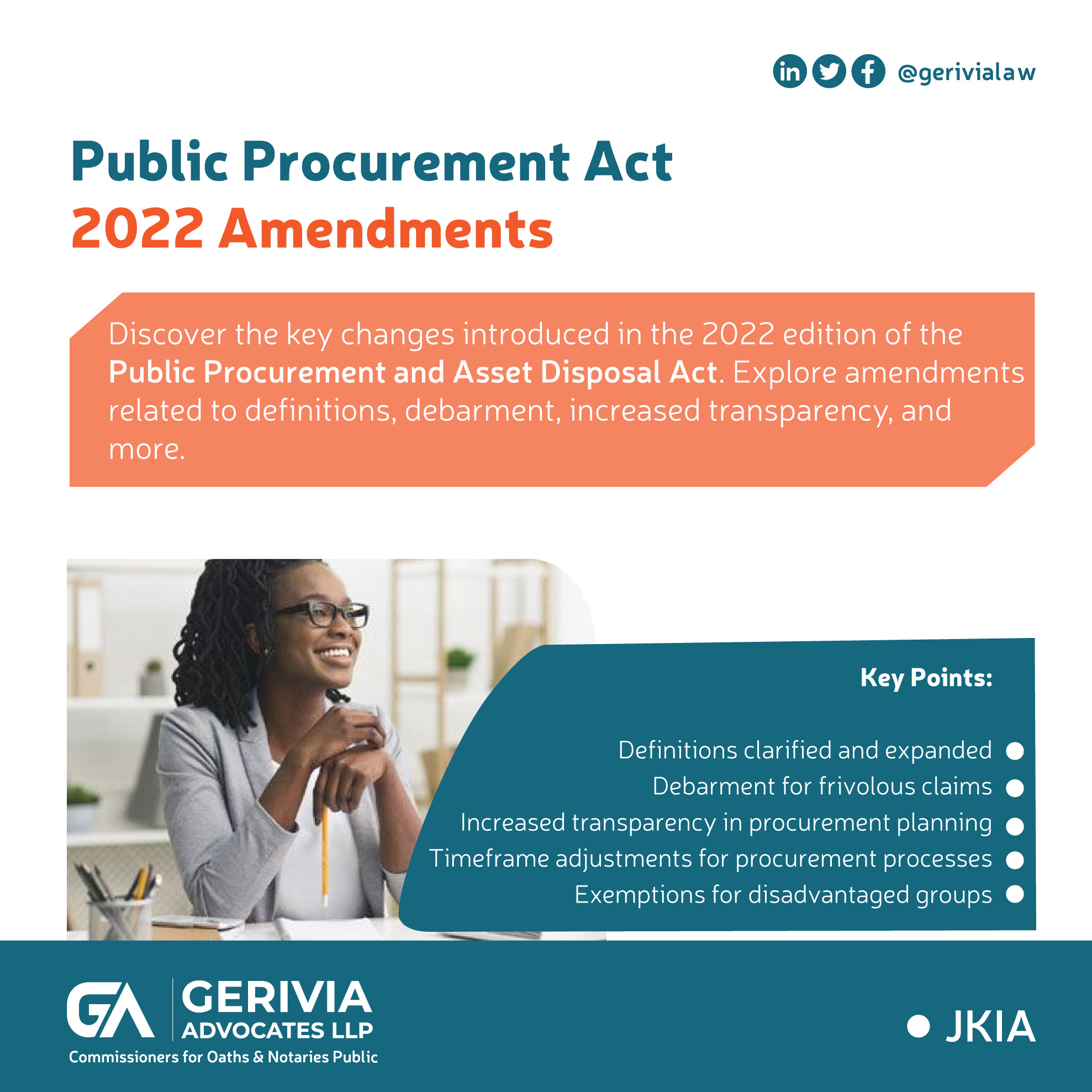Your team attended the tender opening. As the bids were read out, you gladly discovered that your bid of Kshs. 105,600,000 was the lowest.
You place the champagne on ice and take the team out for an extended lunch. Great job team! You bellow in between juicy ribs. You dish out generous bytes of leadership, ethics, power and success to the young bewildered audience. Good times are coming.
Two weeks later you receive an email with an attachment from the parastatal:
“…. Your tender was disqualified for not meeting the requirements namely; your CR 12 was not stamped by a Commissioner for Oaths”. The tender was awarded to (your competitor). We wish you all the best in future bids”
You cannot believe it. “No no no, this is not right. Cannot be right” you whisper to yourself, palms sweating, heavy breathing and blurry eyesight. “Judith!” you yell over the intercom. “Get me that document” You are sure it was a mistake.
You impatiently leaf through, taking on pages with fear and anxiety, missing the CR 12 twice. After a while you find it. In consternation you find its true – the CR 12 is there, but it is not stamped as required.
“Get me the team!” you yell at Judith. In 5 minutes, the entire team is ushered in. They sense trouble. They are scared by your breathing, shaking hands and thin sweat. Big trouble.
“Who sent the documents to the advocates?” You demand. Everyone looks at Tom, the youngest member of the team, a three-month gig intern. In his defence he points at Martha who singled out the documents given to him for commissioning. Martha points to Edward who double checked the tender. Edward fingers your deputy Mary.
Mary is now on the spotlight. She mutters: “the tender was on your desk for two days before submission. You okayed it.” You are angry, and for many reasons. At them for missing the stamp. At yourself because you never went through the document, you are angry at everyone. “Get out!” You scream. You bang the desk and kick the trash bin, mouthing expletives … it’s a bad morning.
You call your lawyers, your colleagues, your seniors. The answer is the same. That tender is gone. You try to ask – but that awarded company was more than Kshs. 20m higher than the bid you submitted. The answer is the same. Your cause is lost. You ask God why.
You hastily lock up the performance contract which you had signed in brazenly unchecked joy. You leave the office for the day. You need a good story for the CEO who you had badgered every day with unsolicited updates on this tender in hope of two step promotion. It is a bad day.
This is a common scenario in many tender situations. This is because our public procurement system is largely undertaken under open tendering system. As the name suggests, any person who is eligible to participate and can meet all requirements is free to participate.
The Public Procurement and Asset Disposal Act (the “Act”) at Section 91 clearly states:
“Open tendering shall be the preferred procurement method for goods works and services”.
The Act goes on to give other procedures which are effectively conditions one is supposed to meet in order to use an alternative method of procurement.
There are three steps in Open Tendering. The first one is preliminary evaluation where all documents are checked for responsiveness. Under this step, the purchasing entities will require and examine the following among others:
- Registration certificate
- Tax Compliance Certificate
- Submission of correct number of copies
- Marking of pages
- Identity cards of directors
- Filling and signing of forms such as confidential business questionnaire
- Binding of documents
- Certificate from regulatory bodies such as National Construction Authority and Insurance Regulatory Authority
- Certificates from member societies of the vendors such as Association of Kenya Insurers, Marketing Society of Kenya and Law Society of Kenya
The failure of a bidder to meet any of these requirements leads to automatic disqualification. It does not matter whether the price is lower or the mistake was minor – the norm is, the bidder is eliminated.
The second step is technical evaluation. Here, the quality of the tender is evaluated. The bidders will essentially be allocated marks. The bidders who manage to reach the set cut off mark are allowed to proceed to the third stage – financial evaluation.
During financial evaluation, the pricing of the tenders is evaluated. Upon conclusion, the lowest evaluated bidder is awarded. That is a typical open tender explained. That is the way vast majority (I believe over 90%) of our bidding is carried out.
For today however, I wish to give you 5 reasons why Preliminary Evaluation should be abolished. I hope that one day our legislative arms will address these issues for the benefit of the people.
Reason 1- The Information is Available Online
Nearly all the information that procuring entities seek from bidders at this stage is now available online. From registration of businesses to meeting of tax obligations, we are now undertaking almost all our legal obligations online. In fact, even while transacting with each other, we are now checking each other’s backgrounds online.
“…ridiculous situation where a procuring entity eliminates a company for lack of one compliance document when that company is already rendering that service to the same government entity under a different contract. That should never happen”.
It therefore beats logic why government entities continue to dwell on paper representations for information readily available by a click of the mouse. The fact that lack of any of these documents leads to elimination, regardless of the price quoted, makes a mockery of the Government in a buyers’ market.
Preliminary evaluation sort of makes our public procurement a circus. Listed companies like Safaricom, Britam, CIC, UAP among others often participate in public procurement. It always happens that you will see some of them getting eliminated from procurement proceedings because of lack of a registration certificate – isn’t that laughable?
Is it not easier to just ask them to bring the document, more so if their price was lower?
Finally, there is the ridiculous situation where a procuring entity eliminates a company for lack of one compliance document when that company is already rendering that service to the same government entity under a different contract. That should never happen.
Reason 2 – Waste of Time
There is massive waste of time in preliminary evaluation. As stated above, it makes no sense to eliminate a company that you know since it works for you or a company that is say, publicly listed at the NSE.
In the same vein, and in the spirit of thoroughness, procuring entities normally countercheck the validity of the documents that they accepted at preliminary evaluation with the issuing authorities.
For instance, if a company presented an NCA4 certificate as required, the procuring entity will log on to https://nca.go.ke/search-registered-contractors/ just to confirm the validity of that certificate before moving on to technical evaluation.
The same applies for tax compliance, AGPO requirements, Insurance Regulatory Authority, companies’ registry among others.
The question remains, why not just ask NCA 4 contractors to present bids and then check online if the bidders have met the requirements? Why undertake the same exercise twice.
Traditionally, Government employees retreat from their offices to undertake evaluation from a secluded place especially for high value tenders. For the so-called Grade A parastatals, they even retreat to exotic destinations such as Mombasa and Naivasha and even set up in 5-star hotels – all in search of peace and tranquility for high grade evaluation.
A good portion of that time is taken up checking responsiveness. They leaf through massive documents to check for this and that compliance document.
They check if these documents have been commissioned by a Commissioner for Oaths among other measures just to ensure validity. At the end of the day they then log into those websites to confirm that validity. Surely, that is not good use of resources.
Reason 3 – Loss of Value for Quality and Money
I have always held the position that Government money is our (the people) money. There is a mistaken belief in this country that there is ‘Government money’ or ‘pesa ya serikali’ distinct from ‘my money’. The problem is, the former is often used with abandon recklessness while the latter is used with best financial responsibility practices.
A government procurement officer will tell you that you do not need a big engine/high spec car to run around Nairobi for personal use as such high-grade specs will never be put into use. The same fellow will buy his employer (the Government) a 4 litre, 8-cylinder, 4-wheel drive guzzler to run around Nairobi since probably the kickback will be bigger and really…no one cares, its government money. But I digress.
The point is, you must get value for money if you are a purchaser of goods, works or services, more so when you are buying on behalf of 49 million people. If someone with a lower price leaves out a document which he ought to be having or you know he has or which you can countercheck and find, then by all means you need to check the quality of that person’s proposal.
Our system is too eager to eliminate bidders as soon as possible. An experienced contractor with a better price by Kshs. 100m will be rejected at the beginning of evaluation and we will end up paying Kshs. 100m more. There is something seriously wrong with such a system.
Reason 4 – Reduction of Corruption
I think this would be the biggest achievement if we were to eliminate preliminary evaluation. This stage has been used extensively to perpetrate all manner of malpractice in public procurement. From plucking of pages, insertion of documents, doctoring of information to hiding critical information, corruption has sat deep in preliminary evaluation.
“…implementation of reforms in public procurement in a manner to make Government business mirror the general commerce environment. We must however never get tired to point out where the rot is.”
There is a deep-rooted trend where bids which are lower priced but unwanted are tooth combed just to ensure that they are eliminated by all means necessary. The perpetrators know that in the event that the bids pass preliminary evaluation, they will be unstoppable at technical evaluation. In the zeal to kill the bids, pages are even torn off, copies of bids misplaced (if for instance the bid required a certain number of sets) among other tactics.
As a result, our country loses hundreds of billions to such practices. In a serious set up, employment of systems like online checks will totally remove these ninja tactics and replace them with competition where the Government gets the best shot at the lowest possible bid.
Reason 5 – Unnecessary Litigation
Although as lawyers we benefit from procurement litigation, it needs to be said that there is need to avoid unnecessary litigation. Further, there is room for litigation on substantive issues such as quality, warranties and experience which would enrich our procurement jurisprudence.

It is disheartening when parties are at the High Court arguing about page numbers/pagination/serialization or manner of binding of documents.
In a developing country like ours, the quality of bids and the best price we can achieve should be of utmost concern each time we set out to buy anything.
To offer further insight of the system we created, please read these words by Justice Odunga in Republic v Public Procurement Administrative Review Board Ex parte Meru University of Science & Technology; M/S Aaki Consultants Architects and Urban Designers (Interested Party) [2019] eKLR
“In public procurement regulation it is a general rule that procuring entities should consider only conforming, compliant or responsive tenders. Tenders should comply with all aspects of the invitation to tender and meet any other requirements laid down by the procuring entity in its tender documents. Bidders should, in other words, comply with tender conditions; a failure to do so would defeat the underlying purpose of supplying information to bidders for the preparation of tenders and amount to unfairness if some bidders were allowed to circumvent tender conditions. It is important for bidders to compete on an equal footing. Moreover, they have a legitimate expectation that the procuring entity will comply with its own tender conditions. Requiring bidders to submit responsive, conforming or compliant tenders also promotes objectivity and encourages wide competition in that all bidders are required to tender on the same work and to the same terms and conditions.
- To be considered for award, a bid must comply in all material respects prescribed in the invitation for bids. When any tender is passed over or regarded as non-responsive, the reasons for passing over such tender must be defendable in any court of law. Examples in this regard may include negative banking reports, non-submission of tax clearance certificates, not having the necessary capacity and / or capability, being listed on the Register for Tender Defaulters, negative due diligence reports, a history of poor performance in similar works or services, etc.
- It is beyond argument that our procurement law provides for compliance with tender conditions “in all respects”.On a literal interpretation of the definition of an “acceptable tender” in the act, therefore, it would appear that procuring public entities “must” exclude tenders that fail to comply with the exact requirements of the tender conditions. The legislature does not appear to afford procuring entities any discretion in the matter nor does the Respondent herein or this court have any discretion on such matters”.
Crux of the Matter
There is a worryingly slow pace in implementation of reforms in public procurement in a manner to make Government business mirror the general commerce environment. We must however never get tired to point out where the rot is.
It is sad that a certain cadre of people usually take advantage of these loopholes to enrich themselves at the expense of the public. Sad thing is, these people actually take aim of their own feet. Your relative will fail to get to hospital because you misappropriated funds meant for a road which you rarely use.
A story is told of a man who knowingly sold faulty equipment to a hospital. The equipment would actually act to the detriment of the patient thereby enhancing the deterioration and eventual death. As fate would have it, he got to catch that disease while in a far-flung area of the country. He was thus rushed to a government hospital. The nurses immediately started connecting the faulty machines he had supplied to his body. He vehemently tried to signal them not to – telling them that he will die.
They looked at each other and concluded “The illness is advanced. It has affected the brain” he was restrained and equipment was connected. The rest was his story. I am not sure if it is a true story. I am sure you get the picture.




